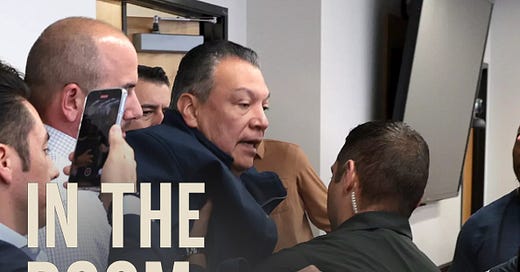This Is How Democracies Fall: From Questions to Cuffs
What happened to Padilla wasn’t a mistake — it was a message: when dissent becomes disruption, who’s safe from force anymore?
by Ivan Ramirez
I wasn’t planning to write again this soon. But I’ve learned that in moments like this, silence isn’t neutrality. It’s surrender.
Yesterday, Senator Alex Padilla was physically restrained, handcuffed, and thrown to the ground after standing up at a DHS press conference in Los Angeles. He identified himself as a sitting United States Senator. He tried to speak. He asked a question about immigration raids. That’s all.
He wasn’t disruptive.
He wasn’t threatening.
He simply broke the silence.
And for that — in the eyes of this administration — he had to be broken in return.
This is how democracies fall. Not with a bang, but with an example.
They didn’t just silence Senator Padilla.
They sent a message.
Not just to him, but to every one of us:
Speak up, and you’ll be next.
In any healthy democracy, a sitting senator has the right to speak, especially when immigration policy is being discussed on the federal stage. This isn’t just tradition. It’s a constitutional protection. The First Amendment doesn’t come with a dress code or a location clause. It doesn’t say “unless you’re inconvenient.”
And yet, when Padilla opened his mouth, federal agents moved as if he were an imminent threat.
Not because he posed danger,
But because he posed resistance.
That’s not protocol. That’s a power play.
And it’s one that doesn’t just punish speech, it rewrites who is allowed to speak at all.
If you’ve studied history — real history — you know the signs.
Silencing opposition.
Turning dissent into disorder.
Conflating presence with provocation.
We’ve seen it in authoritarian regimes the world over.
But now we’re seeing it here.
This isn’t about Alex Padilla.
It could’ve been anyone. And that’s the point.
It’s about the system.
And the system is showing its hand.
A government that handcuffs its critics isn’t protecting democracy.
It’s preparing for life without it.
This wasn’t a rogue decision or a one-time overreaction.
It’s part of a broader pattern.
The National Guard in the streets.
Journalists arrested.
Protesters beaten.
And now — a senator restrained like a threat for asking a question.
Trump and his allies aren’t just flexing power.
They’re erasing boundaries.
The rules are being rewritten, and we’re meant to adapt or disappear.
You don’t handcuff a senator because they’re dangerous.
You handcuff a senator because they’re not afraid.
And that kind of courage, especially in public, is the biggest threat authoritarianism knows.
So what do we do now?
We tell the truth.
We write it.
We share it.
We organize like our lives depend on it — because they just might.
We stop pretending this is just another controversy.
This is not about optics. This is about power: who has it, and who’s willing to use it with violence.
If they can do this to a senator, they can do it to a student.
To a journalist.
To an organizer.
To you.
I named this space The Work Between because I knew we’d find ourselves in moments like this — in the space between democracy and something else. Between comfort and action. Between fear and clarity.
We’re there now.
And no matter how loud the silence gets, I refuse to let it be the last word.
Because I still believe that words — especially the hard ones — can shake the walls they’re meant to silence.
So I’m writing.
Not because it’s safe,
But because it’s necessary.
And if you’re still reading this — if your heart’s pounding and your breath is short —
Good.
It means you’re awake.
It means you remember.
It means you’re still part of the fight.
We don’t stop here.
We build here.


